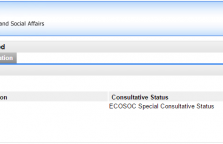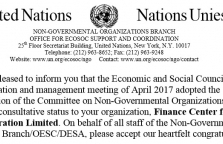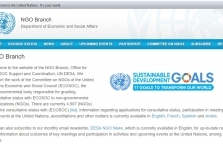On 27 April 2017, Finance Center for South-South Cooperation (FCSSC) received an official notice from the United Nations stating that FCSSC is granted “special consultative status” with the Economic and Social Council (ECOSOC). By bestowing on FCSSC this special consultative status, ECOSOC has officially confirmed that FCSSC activities are relevant to the work of the United Nations and invited the organization to actively engage with ECOSOC and its subsidiary bodies, as well as with the United Nations Secretariat, programmes, funds and agencies.
The United Nations has served since its creation as the main international arena for intergovernmental discussions and in addition, over the years, the decision-making process within the UN has steadily opened to other non-state actors. Today, numerous NGOs participate in major UN conferences and in the UN system as active actors, and not just as observers. Their involvement was initially based on the UN Charter provisions under Article 71 and later updated in the ECOSOC legislation dealing with NGOs.
According to ECOSOC Resolution 1996/31, there are three categories of status: general consultative status, special consultative status and roster status. General consultative status is reserved for large international NGOs whose areas of work cover most of the issues on the agenda of ECOSOC and its subsidiary bodies. Special consultative status is granted to NGOs which have a special competence in, and are concerned specifically with, only a few of the fields of activity covered by the ECOSOC. Organizations that apply for consultative status but do not fit in any of the other categories are usually included in the Roster, as they usually tend to have a rather narrow and/or technical focus. As most NGOs, FCSSC also falls in the category of special consultative status.
With special consultative status, NGOs have the right to designate official representatives to the UN Headquarters in New York and the United Nations offices in Geneva and Vienna, while representatives can register for and participate in events, conferences and activities of the UN. NGOs are able to submit written statements or make oral presentations relevant to the work of the Council on subjects in which these organizations have a special competence. NGOs also have the privilege to be informed about the provisional agenda of ECOSOC and its subsidiary bodies.
Commissions and other subsidiary bodies of ECOSOC may consult with NGOs in special status, and such consultations may be arranged at the request of the NGO. At the same time, NGOs with special consultative status have to fulfill some responsibilities and obligations as well, including to comply with the UN Charter and its principles, actively participate in UN meetings and events, submit a report on the activities of their organizations in support of the work of ECOSOC and the UN once every four years.
Currently, circa 4500 NGOs from around the world have a consultative status with ECOSOC. As an international organization established for three years, FCSSC will bring its contribution to the accomplishment of the noble goals and mission of the United Nations, make a better use of the consultative status to continue its work on promoting sustainable development, advancing the implementation of the Sustainable Development Goals (SDGs), supporting South-South Cooperation and financial integration, industrialization, urbanization and dissemination of green technologies along the Belt and Road countries and regions.



